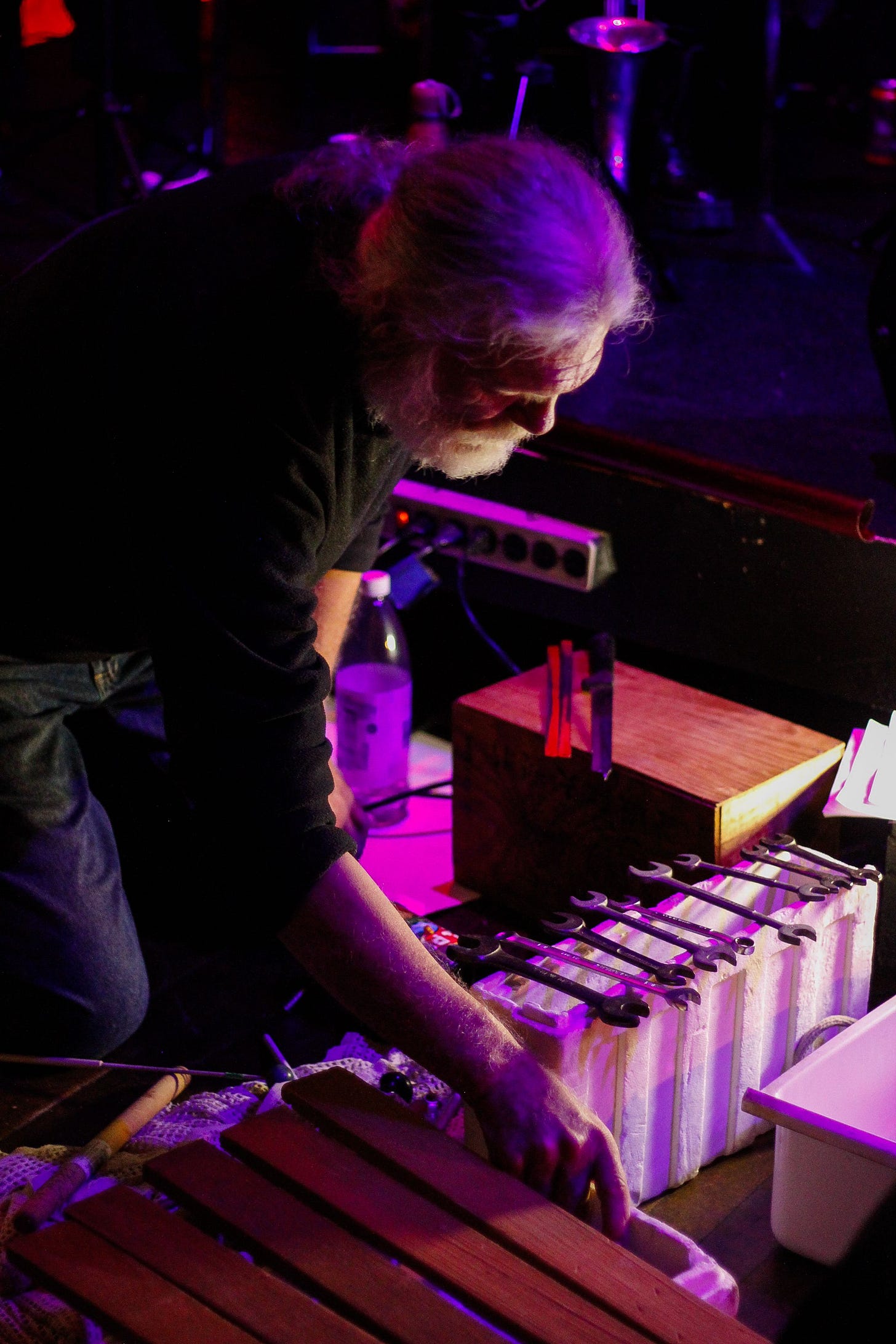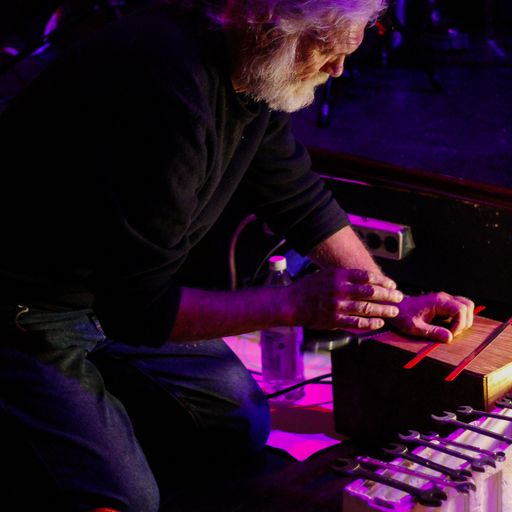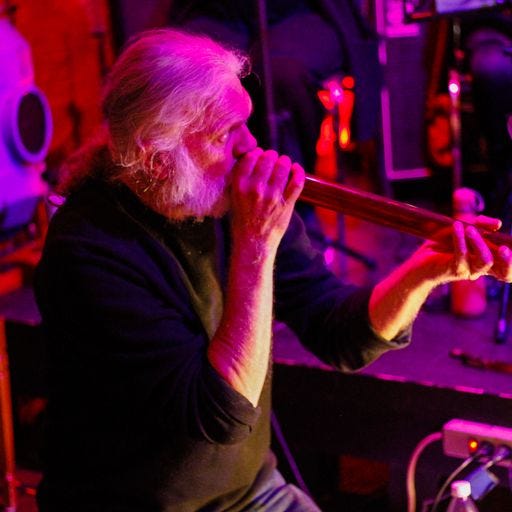The Imprint of a Life on a Music Practice
Interview with music composer, instrument builder and performer Skip La Plante.
“In most cases the loss of a partner or someone close to you causes some ripples in the human net around you, that is your social network or team. It doesn’t affect what is the core of you, but it does affect your relationship to the community. You can lean on your team for support”
1. Do you think music helps us engage with complex and difficult topics such as grief?
The use of music, or silence, in end of life ritual seems very culturally specific. When it comes to grief, everyone’s response will be different, and will be expressed in some form. Those steeped in cultural traditions different from our own may elaborately express their grief in a manner that you or I might not notice or understand but music is certainly part of humanity’s toolkit for responding to grief.
In my case, it was the act of making music in an ensemble as part of a support network which helped me to respond to the loss of my late wife Deena. Music making gave me an opportunity to explore the ways in which Deena influenced me as an artist. My art is not intentionally a tribute to her but a product of our deep artistic collaboration for many years.
2. How has grief and loss changed your approach to music making?
I don’t think it has changed my approach so much as re-affirmed my approach to music making.
What comes to mind is Hasibrari, a music composition which I wrote in 2007 or 2008 shortly after my wife Deena died. My wife Deena was the founder of Arts Indonesia, a skilled dancer versed in a variety of Indonesian dance forms and styles. Among her achievements was the founding of Gamelan Kusuma Laras in NYC. I joined the gamelan shortly after its founding and remained a member until a few months after her death in 2005.
I was a skilled player in the ensemble and learned how to play several of the panerusan instruments, the most complex instruments in the central Javanese tradition. Among the musical forms I learned to play were patetans. I think it is safe to say that there is nothing in the Western musical tradition that is organized quite like a patetan.
Deena was a remarkable organizer and impresario. She made things happen around her, created events out of thin air. She frequently did this for me, and as her health deteriorated she was unable to continue to do that, and for a couple of years after she died I spent a fair amount of time making sure my scores and recordings were archivable but not working with many other artists and not composing any new material.
When my colleague Dan Goode asked me to create a piece for The Flexible Orchestra a few years later, what I created was a patetan of sorts, scored in a way no gamelan music ever would be, but incorporating a few of the salient organizing principles of the patetan musical form. I didn’t think of it this way at the time, but Hasibrari is a tribute to Deena.
I’m not sure it's fair to say that I didn’t create much for a couple of years because I was grieving, and I don’t think it's fair to say that Hasibrari is a statement about that grief, but that piece relaunched my career as a composer. Same old me working at the very edges of a musical tradition, or perhaps in the space where a few disparate traditions intersect so not transformative in the sense of embarking on a new path, but feeling restored and re-committed after a period of loss.
3. Do you have any reflections to share with a musician or an artist facing a major loss?
My wife Deena and I were a team, significant players amongst the cohort of musicians and dancers that we worked on various projects together. Losing a member of the team means the team must change. But the structure of the team remains.
In many cases other people can step in and allow the team to keep functioning. Sometimes a team can’t maintain its former activities. In Deena’s case there wasn’t another dancer skilled enough at various Indonesian dance traditions who could lead Bali-Java Dance Theater and so the dance company died with Deena.
Sometimes a team re-orients when someone leaves. Deena had performed with the musical group Gamelan Son of Lion several times when she was alive. I had only performed with them once but joined as a long term member after Deena was gone. Through the community this group provided, I have made other connections.
In most cases the loss of a partner or someone close to you causes some ripples in the human net around you, that is your social network or team. It doesn’t affect what is the core of you, but it does affect your relationship to the community. You can lean on your team for support.
Bio
Skip La Plante invents, builds, composes for, performs on and teaches with musical instruments built from trash and found objects. His favorite food is wild raspberries. About 200 of his compositions have been presented professionally, nearly all created for solo performer or ensembles playing largely if not entirely instruments he built. About half of those compositions were created for small modern dance troupes including a long collaboration with choreographer Wendy Osserman. Many of the rest were created for new music ensembles including Music for Homemade Instruments (1975-2005) and Gamelan Son of Lion (2006-present). The American Festival of Microtonal Music has presented about a dozen of his compositions. His instruments have been exhibited at The Smithsonian Institution, PS 1, The Library for the Performing Arts, Materials for the Arts, New Music America and elsewhere. Skip has appeared on Mr. Rogers Neighborhood and worked with Joseph Chaikin and Sam Shepard on several theater projects. As a teaching artist he has appeared in about 1700 programs with Bash the Trash, Carnegie Hall, Young Audiences NY, Materials for the Arts, Brooklyn Philharmonic, Open Classroom Collaborative and others. Skip is a classically trained bass player also spent two years in Java, Indonesia studying gamelan performance and instrument construction,
Listen to Skip's Music and learn about his process for building his musical instruments at this link!
If you’re seeking music for a funeral or memorial service in honor of a loved one, feel free to reach out. Sound & Memory creates custom music programs across genres. You can learn more about our live music offerings at this link.
⭐️ Give the gift of music to the bereaved
⭐️ Support death positive public programs delivered through music
⭐️ Sponsor a person in need of death doula support (end of life planning and legacy building)
Make a TAX DEDUCTIBLE donation to Sound and Memory





